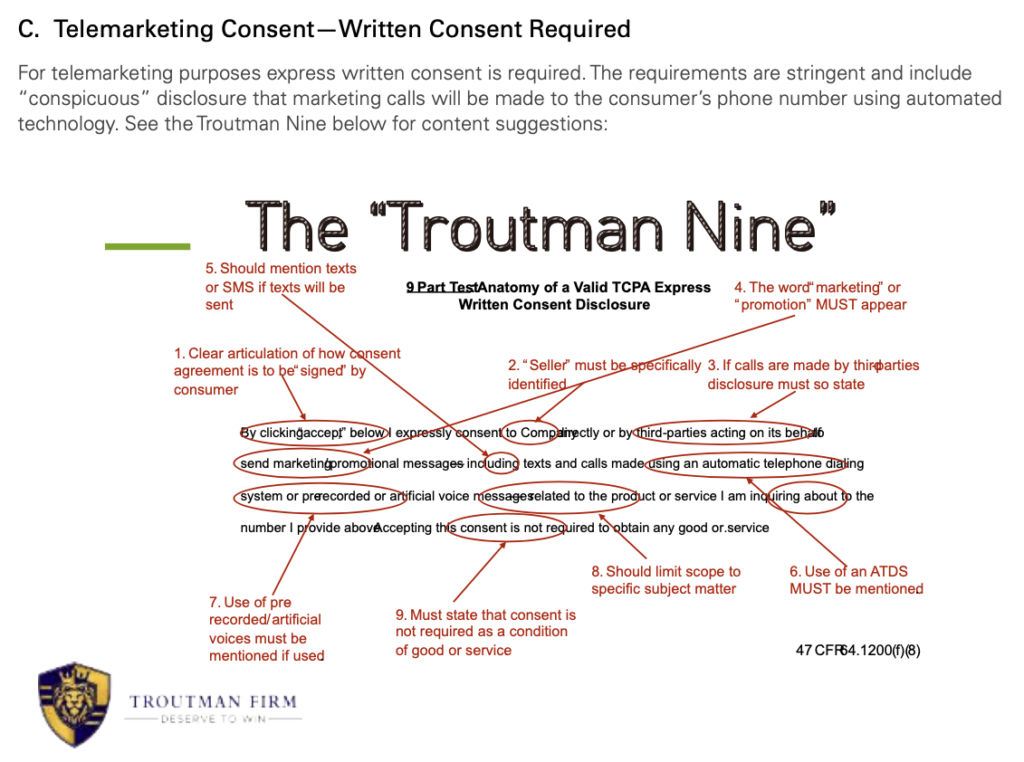Why obtaining TrustedForm certificates is vital to keep your lead-selling business running smoothly

In the marketing world, time runs fast and changes happen quickly. In order to navigate it, you have to be alert about new laws and regulations, and be able to adapt and find solutions that will help you keep your business running and thriving.
However, when it comes to the TCPA, lead vendors foster a misconception that can potentially cost them their business: In the event of a TCPA litigation or lawsuit, the fault only falls on the lead buyer, the one actually calling or texting a lead.
In this article, we will explore the ins and outs of the TCPA, and how this misconception is not only wrong, but also very dangerous for lead vendors. Let’s dive in!
What is the TCPA?
The TCPA (Telephone Consumer Protection Act) is the primary federal law that regulates telephone solicitations.
It was first signed into law by President George H.W. Bush back in 1991 and has remained the backbone of federal telemarketing regulations ever since. After that, the Federal Communications Commission (FCC) and Federal Trade Commission (FTC) have built further legislation – such as the 2019’s TRACED Act – on the TCPA’s foundation.
Who must comply with the TCPA?
Any person, business, or entity that conducts telephone solicitations, including voice calls, faxes, VoIP calls (Voice over Internet Protocol), and text messages.
The TCPA defines “telephone solicitation” as “the initiation of a telephone call or message for the purpose of encouraging the purchase or rental of, or investment in, property, goods, or services, which is transmitted to any person, but such term does not include a call or message (A) to any person with that person’s prior express invitation or permission, (B) to any person with whom the caller has an established business relationship, or (C) by a tax-exempt nonprofit organization.”
What are the requirements of the TCPA?
In order to avoid TCPA violations, marketers must comply with the following requirements.
Restricted time frame
Marketers are allowed to contact consumers only between 8:00 AM and 9:00 PM (according to the recipient’s time zone).
Internal Do Not Call (DNC) list
Marketers are required to keep an internal DNC list of consumers who expressly asked not to receive any calls or texts.
Automatic Telephone Dialing Systems (ATDS)
Autodialed marketing calls and texts to cell phones and other devices where the recipient might be charged for the call without prior express written consent are restricted by the TCPA, as well as non-marketing autodialed calls without prior express consent.
Robocalls
Marketers can’t use an artificial or prerecorded voice to call a consumer for marketing purposes without prior express written consent.
Identification requirements
When calling, marketers are required to provide their name, the name of the company on whose behalf they are calling, and a telephone number or address which can be used to get back in touch with them.
National Do Not Call Registry
Marketers are required to suppress phone numbers listed on the National Do Not Call Registry. Reminder: some states have their own local DNC lists as well, which are separate from the federal list.
The big misconception about the TCPA
Lead vendors assume that in the event of a TCPA litigation or lawsuit, the fault for contacting consumers without having requested consent to contact only falls on the lead buyer, the one actually making the call or sending the text.
Not only is this assumption inaccurate, but it can potentially be harmful to your business. In fact, in a TCPA litigation or lawsuit, all parties involved can be considered responsible, lead vendors included.
As stated in the TCPA, these regulations do not solely apply to those who conduct marketing campaigns. Other entities may be found vicariously liable for TCPA violations, even if they did not commit the violations themselves.
So, as a lead vendor, if you sell leads you acquired without documentation of consent, you’ll also find yourself in the line of fire.
Why lead vendors should comply with the TCPA
Here are some stats and insights collected from Eric Troutman of TCPAWorld, one of the best-known lawyers in the U.S. telecom legal space, that will make you think twice about non-compliance to the TCPA.
- While the number of TCPA cases has dropped over the past years (2016-2020), the number of TCPA class actions still went up and remained 50 times higher than what it used to be in previous years. The threat of TCPA litigation remains ever present, with 3.9 average new TCPA lawsuits filed daily and 3,600+ TCPA cases filed annually.
- The TCPA is the single broadest restriction on constitutionally protected speech in U.S. history. Each violation includes a massive $500 to $1,500 penalty which, along with the availability of uncapped statutory damages and a four-year statute of limitations, makes the statute one of the deadliest consumer protection statutes in the books.
- While largely enforced in the civil context, a violation of the TCPA may also constitute a crime. Because the TCPA is found within the Communication Act, a violation of the TCPA may result in prosecution under 47 U.S. Code § 501.
- The TCPA is the largest cashcow in U.S. history. It’s the single largest producer of multimillion-dollar settlements in history.
Don’t roll the dice, protect yourself
Everyone tries to pass the blame, but the fault falls on all parties involved. As a lead vendor, you want to be smart about this. Our advice? Don’t roll the dice! Because when you do, it’s going to increase the chances of ruining your business. It may just be a matter of time.
So, how do you mitigate the risk of incurring TCPA litigation and lawsuits?
Use consent forms on your websites
The best thing you can do to ensure TCPA compliance is to have your web forms on point while documenting consent and certifying leads. How? Here are some tips and tricks to help you with that:
- Make disclaimer language unmistakably clear by using visible font, color, and size for your text.
- Make sure the agreement to Terms stands out from the surrounding text.
- Don’t bury the agreement to Terms in a lengthy paragraph.
- Avoid a cluttered page or distracting text or imagery.
- Use short, simple sentences.
Below, you can find an example of how written consent should look, to be TCPA compliant.

Implement a system that allows you to verify proof of consent
Whether generating leads for your own use or selling them in the marketplace, there is an easy way to collect and store details about the leads you generate from your websites. ActiveProspect’s TrustedForm can provide unbiased, third-party documentation of consent.
Issue TrustedForm certificates for every lead you generate
If you’re a lead seller, TrustedForm Certify documents precisely when and where consent was obtained and allows you to provide evidence for each lead you generate quickly and reliably.
You can capture every lead event by simply adding a javascript snippet to your web forms. These lead events, such as mouse movements, clicks, and key presses, are captured and stored. Session Replay can then give a moment-by-moment replay of precisely what happened on the page in the order it happened to provide the most authentic record of the end user’s interaction with the form.
Watch this short video to see how easy it is to implement TrustedForm Certify.
The best part? The Web SDK is available to everyone for free by simply signing up for an ActiveProspect account.
Retain the certificate so you can access it when you need it
If you generate leads for your own use, TrustedForm Auto-Retain helps you comply with TCPA regulations by retaining proof of consent for every domain you verify with ActiveProspect.
Implementing Auto-Retain is extremely easy, all you have to do is:
- Create a free ActiveProspect account.
- Implement TrustedForm Certify.
- Enter your payment information.
- Enable the Auto-Retain option next to each domain.
Despite common belief, if you’re generating leads and you’re not certifying them, you’re in the line of fire. Use TrustedForm to protect yourself and mitigate the risk of incurring TCPA litigation and lawsuits.
TrustedForm is the highest standard for independent proof of consent, and more and more lead buyers are relying on vendors to certify leads with TrustedForm to gain protection.
Start certifying leads for free with TrustedForm
The risks associated with TCPA violations can be costly to your business. Don’t roll the dice and gamble on your future. Make the right choice for yourself and for your lead buyers: Start using TrustedForm Certify for free now!


